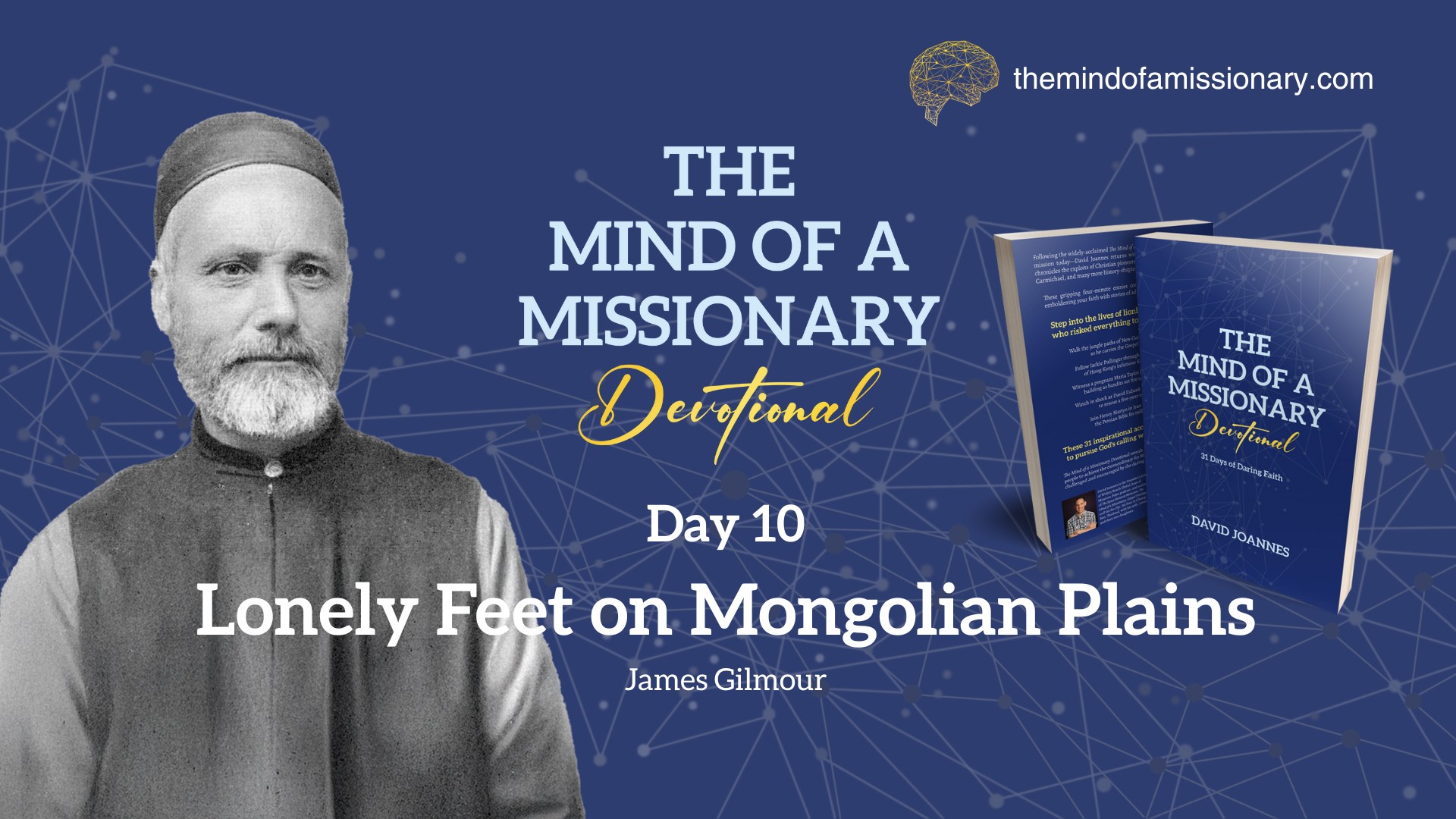Day 10
The Mind of a Missionary Devotional
Lonely Feet on Mongolian Plains
James Gilmour
“All these people were still living by faith when they died. They did not receive the things promised; they only saw them and welcomed them from a distance, admitting that they were foreigners and strangers on earth.” — Hebrews 11:13
On May 18, 1870, James Gilmour stepped off the boat at Peking (now Beijing) into a country in crisis. On the same day, an angry mob in Tianjin, Beijing’s port city, slaughtered two Catholic nuns and Chinese converts in a frenzy fueled by vicious rumors. Locals accused missionaries of kidnapping and killing Chinese children to harvest their eyes for the production of expensive medicines. A jar of pickled onions discovered in an orphanage was presented as proof of the outrageous claims.
Hundreds of people plundered Catholic institutions and foreign buildings, including the Tianjin Cathedral and four British and American churches, before torching them. The mob raped and mutilated ten nuns, leaving their remains in the broken-down buildings. Sixty people were killed in the massacre, forty of whom were Chinese Christians. During those terrible days, no missionary was safe. The bogus rumors ignited a firestorm of fear and hatred that erupted in anti-foreigner sentiment for more than a month.
On June 23, Gilmour crouched in his small room and penned a short entry into his diary. “We are all living on the slope of a volcano that may put forth its slumbering rage at any moment,” he wrote. Though the Scottish missionary could not have chosen a more perilous time, God’s providence undergirded Gilmour’s desire to sow Gospel seeds in China and, eventually, on Mongolia’s lonely plains.
James Gilmour was born on June 12, 1843, to godly parents in Glasgow, Scotland. His mother read missionary stories to him and his five brothers, planting the desire for foreign missions at a young age. In 1867, he offered himself to the London Missionary Society and was assigned to open the long-considered field of Mongolia.
Three months after arriving in China, Gilmour began his long and arduous journey through the Gobi Desert to the plains of Mongolia on August 5, 1870. He endured bone-chilling winters sleeping in tents as he galloped across the desolate plateau chasing rumors of spiritual openness. Gilmour preached boldly, dispensed medicine to the ailing, and sowed Gospel seeds generously throughout the country. However, he could not report one Mongolian convert by the end of 1874.
Ten years later, on one of his most remarkable Mongolian journeys, he sat in a mud hut filled with smoke so dense he could barely see the man stirring the fire inside. However, the man’s voice was music to his ears. He had heard about Jesus Christ and now wanted to become His disciple. Despite the dirty, dismal surroundings, Gilmour said, “The place was beautiful to me as the gate of Heaven, and the words of the confession of Christ from out the cloud of smoke were as inspiring to me as if they had been spoken by an angel from out the cloud of glory.” The missionary now boasted one single convert after fourteen years of hard toil.
A new zeal grew in Gilmour’s heart. During one eight-month campaign, he traveled 1,860 miles, aided 6,000 patients, preached to 24,000 people, sold 3,000 Gospel books, and distributed 4,500 tracts. Though the Mongolians affectionately referred to the missionary as “Our Gilmour,” only two openly confessed Christ through his efforts. His business was to sow the seed, believing God would give the increase in His own good time.
When the faithful missionary returned to England for much-needed rest in 1889, his frame was so thin and the marks of struggle so prominent on his face that his friends did not recognize him. But Great Britain could not keep the man long. He returned to Mongolia with less than two years to live. On Thursday, May 21, 1891, the lonely wanderer of the Mongolian plateau lost his battle to typhus fever and passed through the gates into God’s city. When news of his passing circulated throughout Mongolia, men and women wept like children when they were told that “their Gilmour was dead.”
His friend and biographer, Richard Lovett, wrote, “Mongolian missions will always be difficult to carry on, but the Church is never without heroic souls who will be the lineal successors of this pioneer. James Gilmour has sown so richly on the hard Mongolian plain and over its eastern mountains and valleys. In due time, we shall reap if we faint not.”
The scattered seeds Gilmour sowed produced a harvest of Mongolian souls who embraced the Gospel message over a century later. By 1990, no more than forty Protestant Christians could be counted in Mongolia. Today, an estimated 40,000 believers have met Jesus partly because of one obstinate Scotsman’s faithful feet on lonely plains.
– Personal Response –
Passage: All these people were still living by faith when they died. They did not receive the things promised; they only saw them and welcomed them from a distance, admitting that they were foreigners and strangers on earth. (Hebrews 11:13)
Point: Faithfulness in obscurity matters. God sees every seed sown, even when no fruit is visible.
Ponder: Are you willing to serve without recognition, trusting God to bring the harvest in His time?
Prayer: Lord, make me faithful in lonely places. Help me trust Your timing even when I can’t see results. In Jesus’ name, amen.
Proclamation: I will live by faith, not by sight, sowing Gospel seeds even when the ground seems hard and barren.
Practice: Reach out to someone who seems spiritually closed or indifferent today, and show them Christ’s love, without expecting immediate results.
Learn more about The Mind of a Missionary Devotional at themindofamissionary.com




